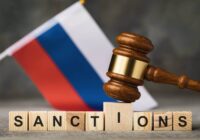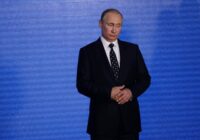The saga of the self-proclaimed republics of Donetsk and Luhansk demonstrates the oft-proven scenario that separatist regions reliant on an outside power are difficult to govern and manage.
On August 31, breaking news from Donbass flowed in quickly, but developments from the region no longer garner notable international headlines like in the earlier days of the conflict in eastern Ukraine. Alexander Zakharchenko, the separatist leader of the self-proclaimed Donetsk People’s Republic (DPR), was killed in an explosion at the Separ café in the rebel stronghold. Zakharchenko, along with other members of his administration, had gathered to remember Iosif Kobzon, the celebrated Russian crooner and politician, who had passed away the day before. (Kobzon openly expressed his support for the DPR and, as a result, developed cordial relations with Zakharchenko.)
It was later revealed that the lethal bomb had been placed in a lighting fixture, activated by a mobile call. The location and placement of the explosive are telltale signs that those behind the operation were closely familiar with their target.
Deflection of blame emerged immediately. The chief of staff of the Ukrainian Security Services (SBU) Ihor Huskov proposed that Zakharchenko could have been killed by criminal elements within the Donetsk separatist movement unhappy with his leadership or by Russian security forces. This last supposition is peculiar as days prior to the assassination, on August 28, Ukrainian military expert Yuriy Karin surmised that a Russian delegation would replace the DPR prime minister in an “undramatic” way. One must wonder if this is political framing, conditioning for impending events or simple coincidence.
While President Vladimir Putin was cautious not to identify Ukraine as the perpetrator, statements from the Russian Foreign Ministry did not flinch from finger-pointing, calling on Kiev “to stop relying on terrorism to resolve Ukraine’s domestic issues.” This sentiment aligns with the objective of Russia’s Investigative Committee to conduct a probe defining the assassination as “international terrorism.” Former head of Russia’s Federal Security Service, the FSB, Nikolai Kovalyov, conjectured that Zakharchenko’s murder could have easily been conducted by the SBU.
Even Chechnya’s President Ramzan Kadyrov, always quick to back Putin, opined that the Ukrainian government tolerates lawlessness. While exact motives behind the assassination may be unknown at this time, it was absolutely predictable that Russian and Ukrainian narratives would be incompatible.
Other high-ranking Russian politicians focused on why Zakharchenko was eliminated. Both Russian foreign minister, Sergey Lavrov, and Putin’s press secretary, Dmitry Peskov, offered that the removal of the leader of the Donetsk separatists was a provocation to stall any further implementation of the ongoing Minsk peace process. This perspective is in opposition to the Ukrainian contention that Zakharchenko was too problematic for Moscow and its operational goals in Ukraine and thus needed to be removed.
A Dangerous Profession
Being a warlord in the Donbass is a deadly occupation. From 2015, numerous prominent rebel figures met a violent end. These include Alexander Bednov, Pavel Dremov and Aleksey Mozgovoy, commanders of the various battalions of the Luhansk People’s Republic (LPR). Former LPR Prime Minister Igor Plotnitsky survived a car bomb but later resigned his leadership position, while Gennady Tsyplakov, another former LPR leader, committed suicide in detention, allegedly “consumed with guilt over ‘the gravity of his crime.’” The famous internet duo of fighters, Arseny “Motorola” Pavlov and Mikhail “Givi” Tolstykh died by an improvised explosive device and rocket attack, respectively.
Zakharchenko’s demise seemed more of a question of when rather than if. In the aftermath of the death of Arseny Pavlov, he called for an escalation of hostilities against Ukrainian forces, while at the same time sources reported he lost meaningful command over the Donetsk militias. Zakharchenko was vocal in his aspiration to see Donetsk annexed to Russia, and this clashed with Moscow’s official policy that the conflict must be resolved diplomatically within Ukraine.
Ukrainian authorities sought a criminal prosecution for Zakharchenko as a founder of a terrorist organization. International groups such as Amnesty International issued demands for Zakharchenko to release imprisoned journalist Stanislav Aseev — appeals that went unanswered.
The main question that overhangs the region is whether or not the assassination of the rebel leader will result in the escalation of the simmering war. At this time, it is too early to tell, and it seems as though it is business as usual in the DPR. Dmitry Trapeznikov has assumed the role of prime minister, and Donetsk has established security protocols around the self-proclaimed territory.
In a wider context, it simply does not make sense for such a singular event to trigger a larger-scale conflict. Kiev may be focused on recovering the occupied territories, and the assassination may provide an incentive to do so. This comes against the backdrop of the acknowledgement on April 30 that the United States delivered Javelin anti-tank missiles to the Ukrainian government and the recent harassment of US ships by Russian vessels in the Sea of Azov. But Russia has other geopolitical concerns — primarily Syria — which require directed focus, and would prefer an approach of managed stability in neighboring territories.
It may be best to simply recover some regional composure and focus on implementing the Minsk Protocol, with conscious and true intentions. Zakharchenko will remain in history as a “thorn in the side” of both Kiev and Moscow — a terrorist and human rights violator to some, and a war hero to others. His reputation is as complex as the situation on the ground.
Theater of War
The saga of the self-proclaimed republics of Donetsk and Luhansk demonstrates the oft-proven scenario that separatist regions reliant on an outside power are difficult to govern and manage. Military interventions that begin with theories of hybrid warfare and hopes of transitioning to a frozen conflict do not necessarily produce geopolitical gains or independence one predicts at their outset. Difficulties in governance become even more apparent when homegrown leadership is required to legitimize such conflicts and present a context of fighting for one’s homeland.
Leaders in these types of militia movements usually have strong personalities and an independent streak. Once they ascend to power through battle and garner respect from their peers, separatist fighters often voice their own personal opinions over the development of their home territories. These thoughts are usually in opposition to the authorities of the de jure nation seeking to retain its sovereignty and barely tolerated by the foreign backers.
Such conflicts become symbolic of larger geopolitical rivalries and ideological disparities. The war in eastern Ukraine, which has claimed over 10,000 lives since 2014, has become symbolic of a Western future versus an Eastern past and the choice to join a coalition of perceived liberal democracy or siding with an international outsider. Demagogues would inflate it as a battle between “good” and “evil.” At a micro level, power dynamics within the self-proclaimed territories develop according to transfers of power and growth of personal wealth. Shades of a distinctive political culture emerge and citizens learn to engage with their new reality. Life goes on.
The war in Donbass can be identified by its lack of truth, an absence of transparency and easily perceptible political differences. It continues to simmer and flare while the global community is faced with greater concerns. Nevertheless, it permitted a former mine electrician to emerge as the prime minister of an unrecognized state. There is a degree of fascination with figures like Alexander Zakharchenko who purport to fight for principles that do not necessarily match the rhetoric of violence.
One cannot question Zakharchenko’s devotion to his native Donetsk, but he was simply one man in a larger theater of war. His dedication resulted in numerous breaches of ceasefires established under the Minsk Protocol, the continued fighting causing unstable socioeconomic conditions for civilians. Only time will tell if new leadership successfully manages to work alongside Moscow and regulate all the rogue elements in Donetsk, in ways that escaped the old guard.
The views expressed in this article are the author’s own and do not necessarily reflect Fair Observer’s editorial policy.
Support Fair Observer
We rely on your support for our independence, diversity and quality.
For more than 10 years, Fair Observer has been free, fair and independent. No billionaire owns us, no advertisers control us. We are a reader-supported nonprofit. Unlike many other publications, we keep our content free for readers regardless of where they live or whether they can afford to pay. We have no paywalls and no ads.
In the post-truth era of fake news, echo chambers and filter bubbles, we publish a plurality of perspectives from around the world. Anyone can publish with us, but everyone goes through a rigorous editorial process. So, you get fact-checked, well-reasoned content instead of noise.
We publish 2,500+ voices from 90+ countries. We also conduct education and training programs
on subjects ranging from digital media and journalism to writing and critical thinking. This
doesn’t come cheap. Servers, editors, trainers and web developers cost
money.
Please consider supporting us on a regular basis as a recurring donor or a
sustaining member.
Will you support FO’s journalism?
We rely on your support for our independence, diversity and quality.






